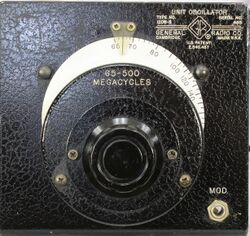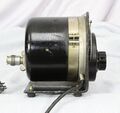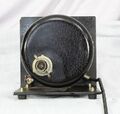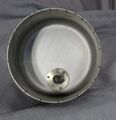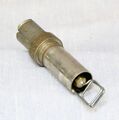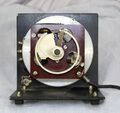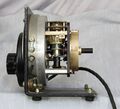1208-B: Difference between revisions
(→Links) |
No edit summary |
||
| (2 intermediate revisions by 2 users not shown) | |||
| Line 1: | Line 1: | ||
{{GR Product | |||
|model=1208-B | |||
|codes=AMEND | |||
|class=oscillators | |||
|summary=Unit Oscillator | |||
|image=GR 1208-B Close-Up.jpg | |||
|caption=General Radio 1208-B Unit Oscillator | |||
|series=1208 | |||
|introduced=1956 | |||
|discontinued=1961 | |||
|designers= | |||
|manuals= | |||
* [[Media:GR 1208-B Unit Oscillator 1208-0100-G 03_1962.pdf|General Radio 1208-B Unit Oscillator Manual 1208-0100-G 1962]] | |||
{{Catalog History}} | |||
}} | |||
The {{Title|General Radio 1208-B Unit Oscillator}} was introduced in {{Catalog O}} and remained available through {{Catalog Q}}. | |||
The Type 1208-B is a general-purpose frequency source covering 65 to 500 MHz. Its an updated version of the [[1208-A]], most of the improvements are mechanical. It finds use as a generator for bridges, admittance meters, and impedance meters. | |||
In combination with an [[874-GA|874-GA Attenuator]], an [[874-VR|874-VR Voltmeter Rectifier]], and an [[874-VI|874-VI Voltmeter Indicator]], the 1208-B provides an accurately known output voltage for receiver testing. | |||
Because the oscillator circuit employs sliding contacts, sweep must be slow and of limited duty. | |||
Direct amplitude modulation at audio frequencies is introduced at a front panel jack. With a [[1000-P6|1000-P6 Crystal Diode Modulator]] accessory, modulation from 0 to 20 MHz is possible that is essentially free of FM. | |||
As a unit oscillator, the 1215-B requires an external power supply, type [[1203-B]] is recommended. | |||
==Specifications== | ==Specifications== | ||
* '''Frequency Range:''' 65-500 MHz | |||
* '''Frequency Calibration Accuracy:''' 2% at no load | |||
* '''Warm-up Frequency Drift:''' 0.5% | |||
* '''Output Power:''' 100 mW minimum, 300 mW at the center of range into a 50-ohm load | |||
==Links== | ==Links== | ||
* [[Media:GR Exp 1215-B 04_1955.pdf|Experimenter October 1955 describing Updated Unit Oscillators]] | * [[Media:GR Exp 1215-B 04_1955.pdf|Experimenter October 1955 describing Updated Unit Oscillators]] | ||
* [[Media:GE 2C43 Triode Datasheet 12_1961.pdf |GE 2C43 Lighthouse Triode Datasheet]] | |||
* [[Media:RCA 2C43 Triode Datasheet.pdf|RCA 2C43 Lighthouse Triode Datasheet]] | |||
* [[tekwiki:067-0532-00|Tektronix 067-0532-00 constant-amplitude sinewave generator]] using a 1208-B oscillator | |||
==Photos== | ==Photos== | ||
<gallery> | <gallery> | ||
GR 1208-B Front.jpg | |||
GR 1208-B Front A.jpg | |||
GR 1208-B Left.jpg | |||
GR 1208-B Rear.jpg | |||
GR 1208-B Right.jpg | |||
GR 1208-B Shield Inside.jpg | |||
GR 1208-B Probe.jpg | |||
GR 1208-B Inside Left.jpg | |||
GR 1208-B Inside Rear.jpg | |||
GR 1208-B Inside Right A.jpg | |||
GR 1208-B Inside Right.jpg | |||
</gallery> | </gallery> | ||
[[Category:Oscillators]] | [[Category:Oscillators]] | ||
[[Category:Unit Instruments]] | [[Category:Unit Instruments]] | ||
Latest revision as of 05:43, 5 November 2024
The General Radio 1208-B Unit Oscillator was introduced in Catalog O (1956) and remained available through Catalog Q (1961).
The Type 1208-B is a general-purpose frequency source covering 65 to 500 MHz. Its an updated version of the 1208-A, most of the improvements are mechanical. It finds use as a generator for bridges, admittance meters, and impedance meters. In combination with an 874-GA Attenuator, an 874-VR Voltmeter Rectifier, and an 874-VI Voltmeter Indicator, the 1208-B provides an accurately known output voltage for receiver testing.
Because the oscillator circuit employs sliding contacts, sweep must be slow and of limited duty.
Direct amplitude modulation at audio frequencies is introduced at a front panel jack. With a 1000-P6 Crystal Diode Modulator accessory, modulation from 0 to 20 MHz is possible that is essentially free of FM.
As a unit oscillator, the 1215-B requires an external power supply, type 1203-B is recommended.
Specifications
- Frequency Range: 65-500 MHz
- Frequency Calibration Accuracy: 2% at no load
- Warm-up Frequency Drift: 0.5%
- Output Power: 100 mW minimum, 300 mW at the center of range into a 50-ohm load
Links
- Experimenter October 1955 describing Updated Unit Oscillators
- GE 2C43 Lighthouse Triode Datasheet
- RCA 2C43 Lighthouse Triode Datasheet
- Tektronix 067-0532-00 constant-amplitude sinewave generator using a 1208-B oscillator
